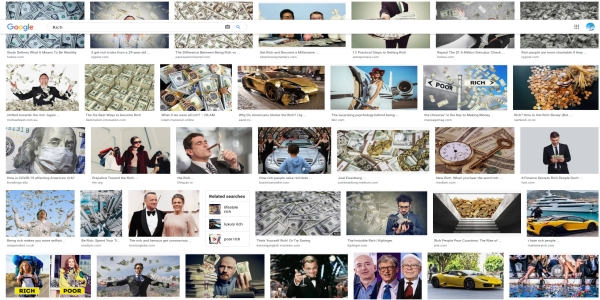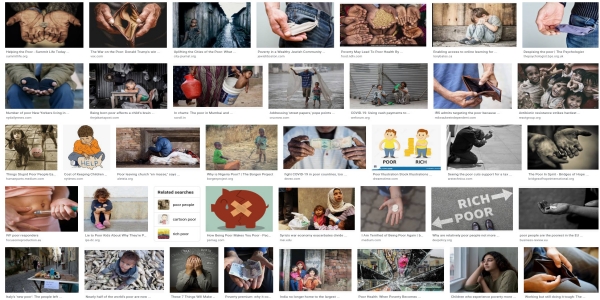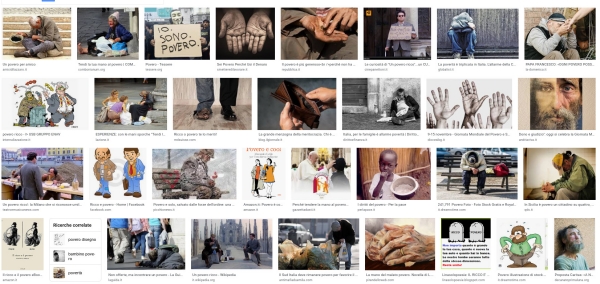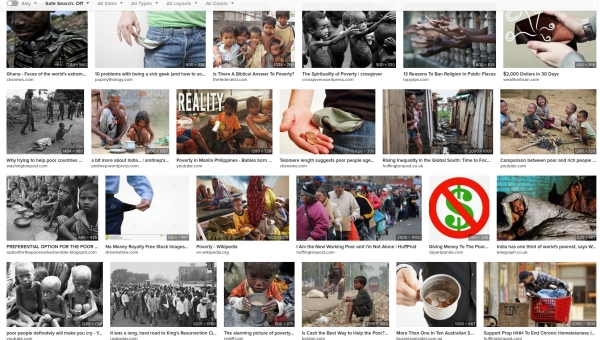What do YOU see, if you search "rich" or "poor" people?
It depends. Maybe. What’s your “LANGUAGE”?
A few days ago, I read an post on an italian website about how technology has created a “culture of haste”. The post is long and interesting, but not really easy reading. However, towards the end it proposes a little, very simple experiment that, in my opinion, everybody should try at least once:
OK, Google: how can I recognize someone rich? Or poor?
Go to Google, search for “Rich”, and then for “Poor”, but in both cases only look at image results. Almost surely, you will see something very similar to what I myself saw:
Rich is white, white is rich

<u><em><strong>CAPTION:</strong>
<a href="/img/rich-in-google.big.jpg" target="_blank">Rich, by Google (click for larger version)</a>
</em></u>
Poor is not white, not-white is poor

<u><em><strong>CAPTION:</strong>
<a href="/img/poor-in-google.big.jpg" target="_blank">Poor, by Google (click for larger version)</a>
</em></u>
Almost surely, that is, almost every human example of “Rich” will be white, but almost none of “Poor” will.
Online or not, is always one and the same world
The author of that post, looking at results that should be almost identical to mine, concludes something as obvious, as it is worth of serious reflection:
(even) online, monetary wealth is synonymous of white skin.
That is, if a white person searches for “rich”, what he or she gets is “the rich are people like me, I too may become like them sometime, somehow. Poor people are different”. Non-white people, instead, would absorb quite different messages.
Algorithms will be algorithms
Now, all search engines results are the outcome of “machine learning”, that is of feeding huge quantities of categorized images to some software, until it becomes able of categorizing by itself new images, as they come. Of course, if almost all the “training” images of rich are of white people, that is what the search engine will learn, and return.
Besides, artificial intelligence is dumb. Heck, for all I know, the algorithms that will parse this page may very well take the two headings above, that obviously have a totally different meaning, as further confirmations that “Rich is white, white is rich”.
So, sadly, nothing new, so far, even if it is extremely useful to see it in this way. Show this post to your friends. But I would like to know something more.
Is “white is rich, etc..” the same everywhere?
How, and how much, this “message” changes from country to country, or from one culture (or language) to another? That is a question from which we could and should all learn a lot. Let’s try!
What color is a “povero”?
Right after taking those two screenshots, I repeated the same test in Italian, by searching for “Ricco” (rich) and “Povero” (poor) on google.it. The “Ricco” results were practically identical, meaning that the first screen only showed (other) white people. The “povero” results, instead, were to my surprise much more “balanced” than the English ones:

<u><em><strong>CAPTION:</strong>
<a href="/img/poor-in-google-italy.big.jpg" target="_blank">Poor, by Google ITALY (click for larger version)</a>
</em></u>
whereas the results for “poor” in DuckDuckgo were these:

<u><em><strong>CAPTION:</strong>
<a href="/img/poor-in-duckduckgo.big.jpg" target="_blank">Poor, by DuckDuckgo (click for larger version)</a>
</em></u>
apparently confirming that the “poor = black” message, or bias, may be in English-speaking cultures, more than in algorithms as such. This, of course, begs the question:
How does this look in YOUR language?
I would really, really like to publish one or more follow-up posts, showing what happens when one does the same searches in other languages, or with different “editions” of the same search engines. If you can, please do it, in any language, even with different search engines, and please send me the results!
Who writes this, why, and how to help
I am Marco Fioretti, tech writer and aspiring polymath doing human-digital research and popularization.
I do it because YOUR civil rights and the quality of YOUR life depend every year more on how software is used AROUND you.
To this end, I have already shared more than a million words on this blog, without any paywall or user tracking, and am sharing the next million through a newsletter, also without any paywall.
The more direct support I get, the more I can continue to inform for free parents, teachers, decision makers, and everybody else who should know more stuff like this. You can support me with paid subscriptions to my newsletter, donations via PayPal (mfioretti@nexaima.net) or LiberaPay, or in any of the other ways listed here.THANKS for your support!